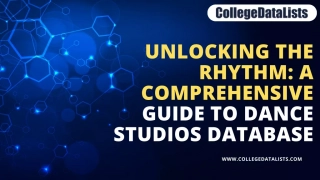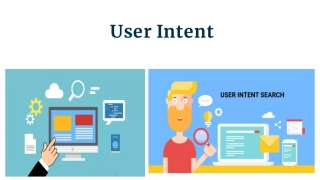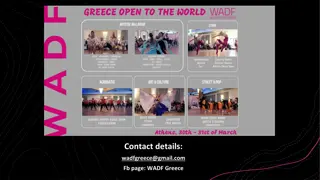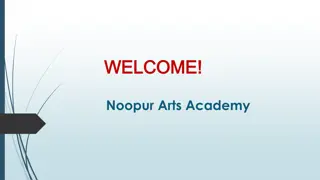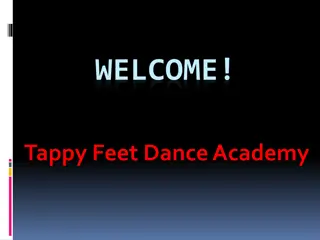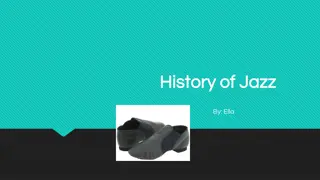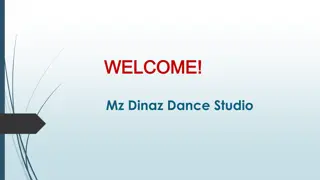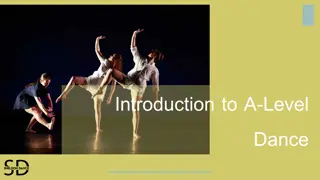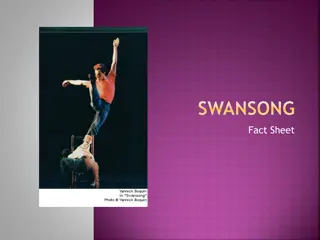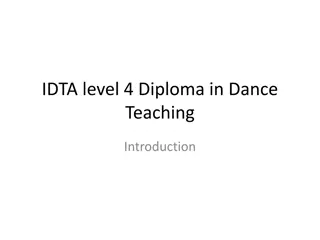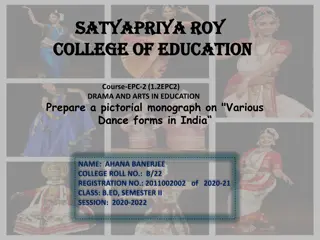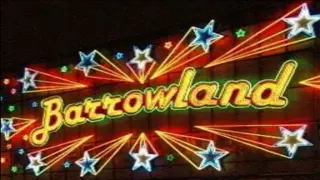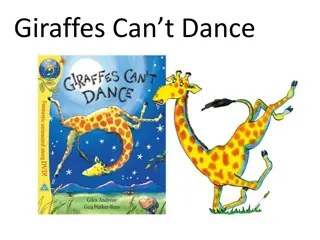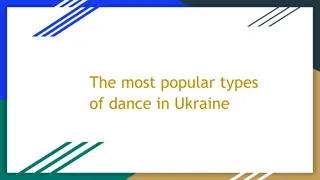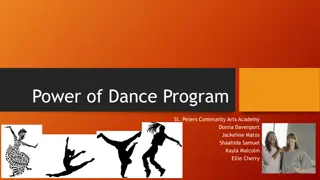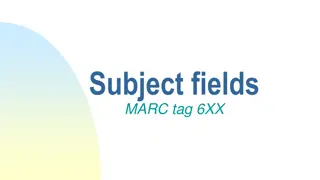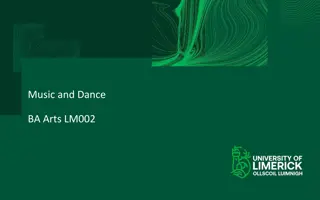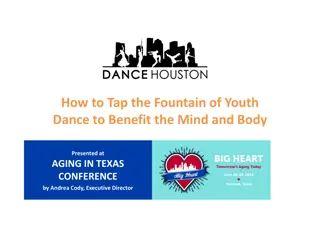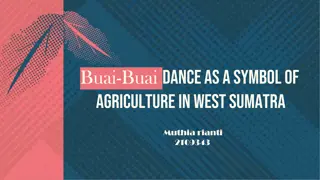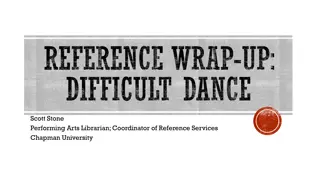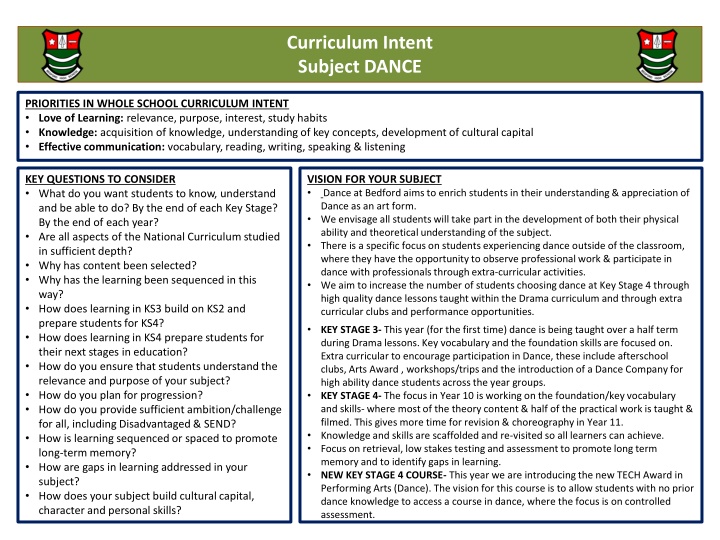
Enriching Dance Education at Bedford: Curriculum Intent and Vision
Dive into the comprehensive curriculum intent and vision for dance education at Bedford school, focusing on developing a love for learning, acquiring knowledge, effective communication, and skills progression. Explore the strategies implemented at Key Stages 3 and 4, along with a new TECH Award in Performing Arts. Embrace a holistic approach to dance education, emphasizing practical skills, mental health, and personal development.
Download Presentation

Please find below an Image/Link to download the presentation.
The content on the website is provided AS IS for your information and personal use only. It may not be sold, licensed, or shared on other websites without obtaining consent from the author. If you encounter any issues during the download, it is possible that the publisher has removed the file from their server.
You are allowed to download the files provided on this website for personal or commercial use, subject to the condition that they are used lawfully. All files are the property of their respective owners.
The content on the website is provided AS IS for your information and personal use only. It may not be sold, licensed, or shared on other websites without obtaining consent from the author.
E N D
Presentation Transcript
Curriculum Intent Subject DANCE PRIORITIES IN WHOLE SCHOOL CURRICULUM INTENT Love of Learning: relevance, purpose, interest, study habits Knowledge: acquisition of knowledge, understanding of key concepts, development of cultural capital Effective communication: vocabulary, reading, writing, speaking & listening KEY QUESTIONS TO CONSIDER What do you want students to know, understand and be able to do? By the end of each Key Stage? By the end of each year? Are all aspects of the National Curriculum studied in sufficient depth? Why has content been selected? Why has the learning been sequenced in this way? How does learning in KS3 build on KS2 and prepare students for KS4? How does learning in KS4 prepare students for their next stages in education? How do you ensure that students understand the relevance and purpose of your subject? How do you plan for progression? How do you provide sufficient ambition/challenge for all, including Disadvantaged & SEND? How is learning sequenced or spaced to promote long-term memory? How are gaps in learning addressed in your subject? How does your subject build cultural capital, character and personal skills? VISION FOR YOUR SUBJECT Dance at Bedford aims to enrich students in their understanding & appreciation of Dance as an art form. We envisage all students will take part in the development of both their physical ability and theoretical understanding of the subject. There is a specific focus on students experiencing dance outside of the classroom, where they have the opportunity to observe professional work & participate in dance with professionals through extra-curricular activities. We aim to increase the number of students choosing dance at Key Stage 4 through high quality dance lessons taught within the Drama curriculum and through extra curricular clubs and performance opportunities. KEY STAGE 3- This year (for the first time) dance is being taught over a half term during Drama lessons. Key vocabulary and the foundation skills are focused on. Extra curricular to encourage participation in Dance, these include afterschool clubs, Arts Award , workshops/trips and the introduction of a Dance Company for high ability dance students across the year groups. KEY STAGE 4- The focus in Year 10 is working on the foundation/key vocabulary and skills- where most of the theory content & half of the practical work is taught & filmed. This gives more time for revision & choreography in Year 11. Knowledge and skills are scaffolded and re-visited so all learners can achieve. Focus on retrieval, low stakes testing and assessment to promote long term memory and to identify gaps in learning. NEW KEY STAGE 4 COURSE- This year we are introducing the new TECH Award in Performing Arts (Dance). The vision for this course is to allow students with no prior dance knowledge to access a course in dance, where the focus is on controlled assessment.
YEAR 10 PERSONAL DEVELOPMENT MENTAL HEALTH/WELL- BEING- Students explore healthy eating, exercise, injury prevention and avoidance of eating disorders. ENRICHMENT/ SMSC- Consider an early trip/workshop for GCSE Students to engage and inspire them straight away. CONCEPTS SKILLS RATIONALE KNOWLEDGE Students will take part in technique classes that will aim to improve their practical dance skills. Students will learn one of the set phrases. Physical skills, Technical skills, Mental skills & Expressive skills Safe Practise (warm-up, cool down, nutrition & hydration) Students need good technique, these lessons will help to identify strengths & weaknesses (baseline assessment of practical ability). Now students have worked on technique, they should be confident to learn the set phrase which they will perform on their own. Component 1- Performance (practical technique classes) and Set Phrase Safe Practice: Warm- up, cool-down, injury prevention, nutrition and hydration. Physical skills, Technical skills, Mental skills & Expressive skills Stimulus & choreographic intention. Describe, analyse & evaluate movement content and production features. Students will learn about safe practise for Section A and B of the written paper. To be able to identify, define and explain the Performance skills needed for Section A & B. Students will describe and analyse a professional work. Working on safe practise and performance skills in the theory will link well to the practical lessons as technique classes will also focus on these areas. Students can create links between their practical and theory exam. When teaching the first work- students will need a full half term, as they will not have done this type of analysis before. There will be a focus on description as this is the important aspect to revise. Term 1 Component 2- Critical appreciation of professional & own work STUDENT LEADERSHIP- Year 10 Dance students to lead extra curricular for KS3 Dance Clubs. Students will learn a group piece based on one of the works. They will also choreograph small sections. Students will learn the 2nd of the set phrases. Technical skills, Physical skills, Mental skills & Expressive skills. Choreographic skills Learning the professional work in a practical way will help students who are kinaesthetic learners. They will also be introduced to choreography but in a simple way (group). Students can learn this movement and bank this element before Year 11. ENRICHMENT- Bedford Dance Show this term. Year 10s will perform their work from class and extra curricular. Component 1- Performance (group piece) and Set Phrase Recalling stimulus & choreographic intention. Describing, analysing & evaluating movement content and production features. Structure of a 6 mark answer. Practise questions for all works so far (revision and retrieval). SPIRIT (T)- Working as a group practically- being sensitive of each others views and abilities. Students will learn the professional work they are learning practically- in a theoretical way. Students will then learn the 3rd professional work. Students to learn the structure of 6 mark answers and to practise these for the 3 works that have been covered. Learning how to structure the 6 mark answers after learn 3 works, will allow students to begin to understand how the question paper will look. This is a difficult part of the exam, but students should be at a position where they feel more comfortable with the analysis process. Retrieval at this point in the scheme will allow students to understand the importance of revision and recap to promote long term memory. Term 2 Component 2- Critical appreciation of professional work
YEAR 10 PERSONAL DEVELOPMENT ENRICHMENT- This term students should be encouraged to participate in the extra curricular opportunities- particularly the whole school production. SPIRIT (P) Revision for the 6 markers. CONCEPTS SKILLS RATIONALE KNOWLEDGE Students will also take part in one off workshops based on choreography that will lead to a small choreographic task. Students will have a mock choreography using the Year 11 stimulus. Choreographic skills The choreographic workshops are skill based, and therefore will give students the tools to try choreography alone. At this point in Year 10, students should now feel comfortable to choreograph a piece on their own. Using the Year 11 paper will prepare them for the process in Year 11. Component 1- Choreograp hy (workshops) & Mock Stimulus & choreographic intention. Describing, analysing & evaluating movement content and production features. Structure of a 6 mark answer. Physical skills, Technical skills, Mental skills, Expressive skills and choreographic skills. Term 3 Component 2- Critical appreciation of professional work & Critical appreciation of own work. Students should now be comfortable with analysing professional works. Therefore Section B questions will be added to this term, so that when practical is complete, they can work on adding the details to their section B answers. Students will learn their 4th and 5th professional works in the same way as previous. Students will learn to structure the 6 mark questions in Section B based on performance skills. Personal Development Year 10 Main Opportunities SPIRIT S- Audition for Bedford Dance Company. Ind- Creating & taking ownership of own choreographies. Equality & Diversity Learning to analyse & understand professional work where performers have physical disabilities as well as different races/life experiences. E & D is discussed when analysing these works. CEIAG Workshops from local colleges and companies that offer dance. Workshops from professional dancers, where they discuss their career paths and where dance can lead. Mental Health & Wellbeing Physical development of fitness, flexibility and strength. K & U of healthy lifestyles inc. diet, exercise, sleep and injury prevention. SMSC Theatre trips to watch professional work. Learning professional work from different cultures. Enrichment Workshops, weekly extra curricular clubs, trips. Annual Dance Show, Arts Showcase, Whole School Production and Christmas Concerts. Student Leadership Leading extra curricular clubs for key stage 3. Students to apply and become dance ambassadors- helping with events and weekly running of extra curricular.
YEAR 11 CONCEPTS Students will complete the choreographic task. Once complete this will be filmed for assessment. SKILLS Choreograph y Skills (research, improvise, select, structure, evaluate). RATIONALE PERSONAL DEVELOPMENT STUDENT LEADERSHIP- Students who choreograph a group dance- teaching the students in their group. KNOWLEDGE Component 1- Choreography This is an important part of the course as it is worth 40% of the overall grade. Students have recently (last term) been working on choreography and the exam paper comes out in September for this element. Students tend to come back in Year 11 with good energy, and as this is a difficult element it is a good time to complete and film this element. Students will learn and practise how to answer questions based on a stimulus in Section A. Students will learn their last professional work. Component 2- Section A SPIRIT (Ind)- Students independently researching and creating their own work. Term 1 Professional Works Creative thinking Choreograph ic skills Technical Skills Working on Section A at the same time as doing choreographies will allow the theory to link to the practical lessons, improving student understanding of both elements. Completing the last professional work in the Autumn term will give students a recap of analysing works but will also give more time for revision through winter and spring. SMSC- Students will be looking at stimuli from a number of sources that will look at various elements of SMSC. ENRICHMENT- Bedford Dance Show this term. Students will learn and film the duet/trio performance. Technical skills, Physical Skills, Mental Skills & Expressive skills Students now have the confidence and technique to perform their best for the duet/trio unit. They should be at the peak of their performance and confidence levels at this point in the course. Component 1- Performance (duet/trio) STUDENT LEADERSHIP/ INDEPENDENCE- Students can audition their own work to be part of the Dance show. Students will learn how to add practical examples to their Section B answers & practise the structure. Students will take part in various means of testing and practising all elements the exam. There will be a focus on retrieval of key information, and structuring the answers. Section B of the exam paper is the section where students nationally struggle. Spending more time on this element and working on it closer to the exam time will promote a better understanding. Retrieval tasks will allow students to work on their long term memory and the gaps in knowledge will be identified early. All dance skills. Particular focus on structuring skills. Component 2- Revision Term 2 ENRICHMENT- Bedford Arts Showcase where exam work is performed. SPIRIT- Practical Exam this term as well as retrieval and revision work.
YEAR 11 PERSONAL DEVELOPMENT SPIRIT- Revision resilience. KNOWLEDGE CONCEPTS SKILLS RATIONALE Past papers and mock exams which focus on upgrading their answers, establishing knowledge gaps and working on timings. Closing the gaps with focused teaching and re-visiting elements of the paper. retrieval practise, quizzing and low stakes testing to encourage quick retrieval and long term memory embedding. One to one and group tutorials covering different areas of the specification. All dance skills Particular focus on structuring specific types of answers. Timings on each section of the paper. Lots of retrieval practise prior to the exam will aid memory. Practising past paper will allow students to become familiar with the structure and wording of the exam questions. Component 2- REVISION Term 3 Smaller group tutorials will allow students to ask questions freely and will allow for more personalised teaching. Finding the areas of weakness for groups, individuals, the class- will allow for better planning of which areas will be covered in more detail. Personal Development Year 10 Main Opportunities SPIRIT Ind- Creating & taking ownership of own choreographies. S- Weekend residential to work on practical and theory work prior to exam. Equality & Diversity Learning to analyse & understand professional work where performers have physical disabilities as well as different races/life experiences. E & D is discussed when analysing these works. CEIAG Workshops from local colleges and companies that offer dance. Workshops from professional dancers, where they discuss their career paths and where dance can lead. Mental Health & Wellbeing Physical development of fitness, flexibility and strength. K & U of healthy lifestyles inc. diet, exercise, sleep and injury prevention. SMSC Theatre trips to watch professional work. Learning professional work from different cultures. Enrichment Workshops, weekly extra curricular clubs, trips. Annual Dance Show, Arts Showcase, Whole School Production and Christmas Concerts. Student Leadership Students to teach their choreographies to other dance students. Students to take ownership of their revision.

